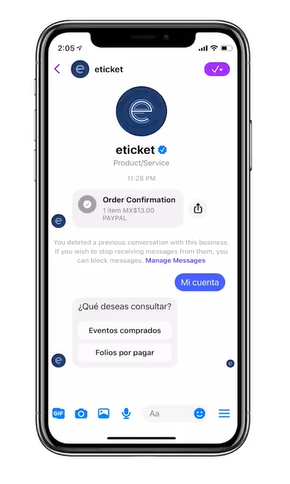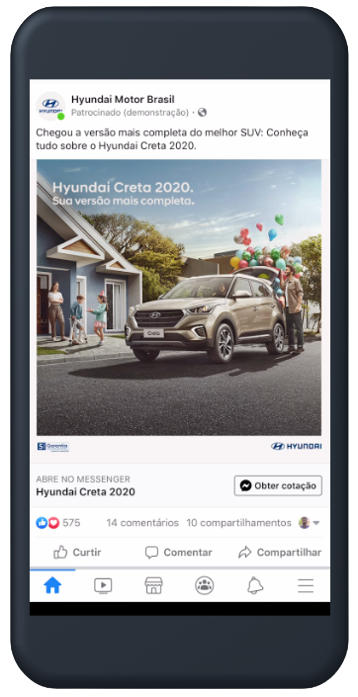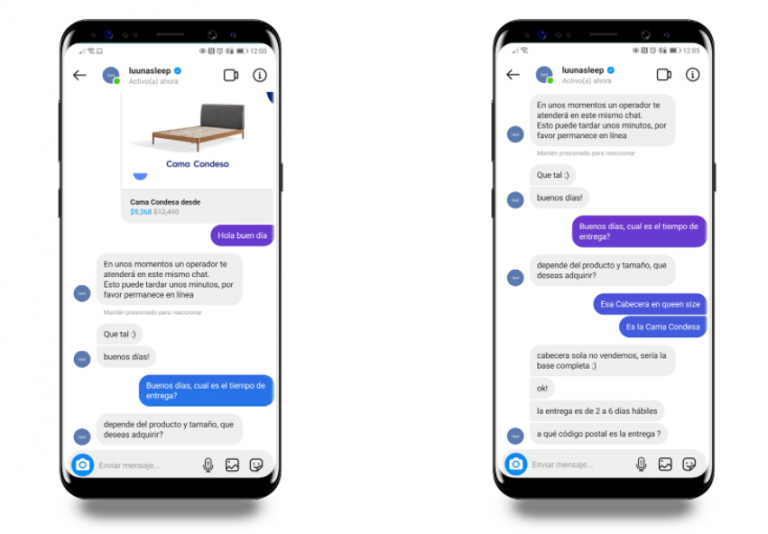Conversations
Facebook Messenger for customer service: 10 examples of successful brands

Conversations

Facebook Messenger is a great channel for businesses to improve their customer relationship and service. In the following, we’ll show how companies like Hyundai, Sephora, Luuna and Newchic are successfully using Facebook Messenger for their customer service.
Facebook Messenger is perfect for easy and quick customer communication. With over 1.3 Billion users worldwide, it is the second-most popular messenger app globally, which makes it a convenient channel for customer communication. Together with automated answers, the multimedia feature greatly improves efficiency as well as customer interactivity.
With Facebook Messenger, customers can easily contact you, ask you questions, make appointments or simply request information.
A few years ago, Meta introduced the Facebook Messenger API that allows companies and verified third-parties to connect to the API, and get even more out of the messaging app for their business.
The messenger API opens up new opportunities for communicating with customers, especially in regards to customer service, and some companies are already putting the service to good use. In the following, we’ll showcase ten companies that are using the Facebook API for customer service in particularly effective ways.
Founded in Poland in the 1990s, CCC is now a leading footwear retailer in Central Europe, and one of Europe’s largest footwear manufacturers. In 2013 they began expanding into Western Europe and by 2018 they were also active in the Middle East. Today they are present in 30 countries with over 1000 stores and over 15000 employees.
They first started using a Messenger-powered digital assistant in order to boost their customer satisfaction.
By September 2020, the shoe retailer had achieved the following:
Messenger has transformed the way we approach customer service. […] It has helped us improve operational efficiency and allowed customers to find answers to their questions quickly.
Robert Prokopowicz, Customer Service Manager, CCC
Founded more than 15 years ago, eTicket is one of the top ticketing companies in Latin America for concerts, festivals and sporting events. For optimal customer service they closely monitor the market for new technologies and tools to implement into their service. Throughout the pandemic, they experienced a boom in inbound message volume. To hold up their efficiency in answering these queries, the company implemented a Messenger Chat plugin as well as Guest User Mode on its website.

During the pandemic, eTicket has so far experienced:
By integrating Messenger with our existing digital assistant, we are now able to help customers create an account seamlessly and can provide customers with fast and efficient communication that answers questions, sends reminders about purchases and events, and provides information our customers need in a much more efficient way.
Adrián Contreras Orezza, Co-founder and CTO, eticket
Hyundai is a South Korean car company with manufacturing plants and dealerships all over the world. They sell their cars in over 190 countries around the globe and are the market leaders in Brazil.
Hyundai wanted to find a faster and more efficient way to communicate with their costumers compared to the e-mail and phone service they were already offering. To achieve that, as well as increase leads and improve conversion rates, they opted for an automated Facebook Messenger tool.

The company permanently implemented the Messenger from Meta into their customer service after a test phase, which saw the following results:
To improve the customer experience, we chose to adopt Messenger as a lead generation channel. […] Our A/B tests revealed that people indicated their interest in purchasing much faster via Messenger, leading to an increase in better quality leads and conversions at lower costs.
Jan Telecki, Deputy Marketing Director, Hyundai
Klarmobil, a Germany-based telco company, offers a complete telco-package, that is easy to understand an is considered a great value-for-money option.
The company recognized that many customer requests were very similar, and that they were easy to resolve. So in October 2020 Klarmobil launched their automated messenger solution in order to improve customer service efficiency and to provide a 24/7 platform for quick and automated question resolving.
From 2018 to October 2020, they experienced the following results:
Together with the automation of more than a quarter of the inquiries coming in through the Messenger this leads to an increasing operational productivity.
Nicole Fölster, Product Owner Chatbot&Voice, freenet AG
Luuna, one of Mexico’s fastest-growing ecommerce companies, provides customers with locally manufactured premium bedding and mattresses. Their goal in customer service is a high-quality customer experience, both in-store and online.
To help with reducing their response time, boost customer engagement and qualify sales leads, they introduced a Messenger API in November 2020.

They have seen the following results since then:
By using the Messenger API, we have been able to streamline all our customer communication in a single place. As a result, we were able to respond to people’s messages faster and provide them with swift and excellent service, which in turn drove greater customer satisfaction and sales.
Esmeralda Reyes, Head D2C Ecommerce Sales , Luuna
Brazil-based Magazine Luiza (Magalu) was founded in 1957 and is currently one of the largest retail companies in Brazil with more than 1,200 stores and 3,5000 employees.
In 2018, following a testing phase with great success, with the help of official Meta partner Sinch they introduced their chatbot persona Lu into their automated Messenger service. Their goals were minimizing response times, reducing the number of calls and improving operational efficiency.
The company introduced a Messenger API, consolidating their various channels, enabling a more consistent customer service experience as well as giving their service team more visibility over the customer queries.

They experienced the following results between October 2018 and October 2020:
Newchic is a B2C online fashion store headquartered in Hong Kong that serves customers in over 200 countries. Founded in 2014, the fashion retailer began expanding its cross-border business in 2015 by advertising with Facebook and was an early adopter of Messenger, looking to reduce friction in the shopping process and forging a closer relationship with their customers.
For that they implemented Facebook Messenger into their customer care in 2018.
As an added bonus for customers they also gave out coupons for everyone that logged in using their Messenger.
Only one month after launch the fashion brand saw already the following results:
As we work to expand our brand, scale our customer care service and connect more closely with our customers, Facebook has provided solutions that help us reach our business goals.[…] This has led to significant increase in user engagement as well as in purchases and revenue.
Miko Su, Head of Marketing, Newchic
Founded in 2013, the fare aggregator operates in 35 countries and helps 25 million monthly users to find the cheapest tickets for plane bus or train.
In order to improve customer care the company adopted a chatbot with automated answers to the most frequently asked questions. This also allowed the live service team to answer the more complex questions more efficient.
Since the implementation in March 2020, Omio saw the following results:
In the midst of the coronavirus pandemic, it was vital that we reach customers with questions regarding travel quickly and efficiently without overwhelming our customer care team.
Michael Esch, Social Media Manager at Omio
The Paris-based online shoe store Sarenza offers over 650 brands and 45,000 styles of shoes for men, women, and children. A part of the French retail conglomerate Monoprix, Sarenza ships to over 30 countries.
With customer satisfaction being one of the companies’ top priorities and the sudden increase in customer queries during the Covid19-pandemic, Sarenza began looking for alternatives to E-Mail and phone-based customer service.
With the adoption of Facebook Messenger into their service program, the most frequently asked questions were given an automated reply, and the more complex cases were transferred to live service operators.

Since the start of the program, Sarenza has experienced the following results:
By shifting to digital channels and focusing on social messaging […], we could easily pursue a hybrid conversational flow that solves customer queries in record times.
Thibault Caron, Head of Customer Service, Sarenza
Founded in 1970, the French beauty retailer is known for their wide range of premium products, including their own private label, Sephora Collection.
As direct customer advice is very important for a beauty retailer, Sephora wanted to create a central platform to deal with their queries on time and at scale.
To that end, they introduced the Messenger API into their client communication system.
Since the integration in 2019, Sephora earned the following results:
💡Sephora also used the Messenger API for implementing Instagram Messaging for their customer communication.
The impressive results from brands from various industries show: customers welcome customer service through Facebook Messenger, and it saves companies money and resources.
In order to replicate the mentioned use cases, you need to connect to the Meta API. The easiest way is to use an out-of-the box solution like Sinch Engage that doesn’t require any IT resources on your part, and is ready to use.
With Sinch Engage, you can streamline all your conversations on one central inbox, even if inquiries come from different messaging apps), and it only takes a few minutes to set up your own chatbot (or have it built for you).
🚀Try out Sinch Engage to see how easily you can scale your customer communication on Facebook Messenger and other messaging apps.